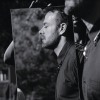Taken from her upcoming debut EP Fuoriorario, out tomorrow on Evar Records, on The Darkness Within, Italy’s NARA offers a full display of her skills in spatial music making. Taking hard hitting, big room techno a step further, NARA turns her demented production into a 3D rendering of madness. A whispered vocal sample, powerful kick and industrial breakdown create the feeling of being on a factory line for demon dolls — a ride NARA insists you stay on till completion. The tone of the track speaks toward the intent behind Fuoriorario (meaning ‘afterparty’ in Italian), to craft something that twists the energy of 90’s post-rave afterparties into a cathartic and sweaty experience. We caught up with NARA ahead of the premiere of The Darkness Within to find out more about the EP, and the inspiration behind the song.
Listen to The Darkness Within below.
Set the tone for us. Where did your journey with music begin?
I always had music around me growing up. My dad used to be a DJ back in the 80s; even if he wasn’t doing it as a job, he has always been really passionate about it. He was into music, and that passed on to me. I started playing the guitar as a kid and became interested in different genres while growing up. My love for electronic music blossomed at 14, the first year of Liceo (the same as High School in Italy). The more immersed I was, the more my love for it grew. I can’t precisely pinpoint a moment where I decided that I was going to make a profession out of it, but it must have been early on, I reckon. Then, just after finishing school in Italy, I moved to London to study Sound Engineering at university. This is what I love about music and sound; it never gets boring, you can always learn!
Tell us a bit about your local scene in Italy. How has it influenced the direction of your sound?
There is not really a big scene where I am from, at least not when I was growing up. Pisa is kind of a small town in Tuscany. There was only one club close to the centre, and it wasn’t playing the music my friend and I were into. So to listen to a certain kind of music, we had to go to big clubs like Tenax and Viper in Florence, Cocoricò in Riccione, and then the usual clubs in Rome and Milan. But they were like a couple of hours away minimum; I can’t forget those never-ending rides on the train, man! Around the same time, in 2009-2010, I met my dear friend Nicola; he was a bit older and in the illegal party circuit. He introduced me to the harder spectrum of sound and raves. I think from that point on, we were going to raves almost every weekend! I fell in love with the scene and the culture. If you look at Tuscany, it makes sense that the rave scene is very much present; we are surrounded by hills, big inhabited villas in the middle of nowhere, old factories, and the seaside. The surroundings really adapt well to every raver’s necessity. It was essential for me to also from the point of belief music was, and it is pretty political, and usually, in that kind of ambience, you stand by a clear point of view. You can find the same music played at raves at some protests, for instance. The kind of music that gives you an outlet for your anger. That is where I initially took my sound from, and I infused it with the sounds I was surrounding myself with here in London. The scene here is enormous; there is space for everything and everyone. You can be yourself, and still, you can find a space where you can feel welcomed.
‘Fuoriorario’, your new EP, is incredibly hard-hitting and heavy. Who are some of your key inspirations?
The idea behind this EP was to create a new take on 90’s Italian Afterparties. The title ‘Fuori Orario’ means just that, afterparty. I drew the picture from an old tape my uncle sent during the lockdown. It was a compilation of nights hosted in the legendary club in Pisa called Insomnia, which dominated the scene in the early 90s till the early 2000’s when it was then closed. I decided to recreate that energy using the scary-horror sounds that ‘distinguish’ my style. I wanted to make something that people could sweat on and let go of their anger on the dance floor, but also something that could leave a mark somehow.
‘The Darkness Within’ is a complex track. It feels almost sculptural. How did you achieve the specific feeling of space and dimension on here, and why was it necessary?
I have been working for a company that deals with video games for a while now, and more recently for the film industry. In both these industries, surroundings and ‘dimensions’ are vital. I love to play with spatial effects and different textures. It gives the track that extra touch that makes it unique. This kind of genre often has a stigma. Hard techno is often mistaken for a genre that can only be played at night and if you are off your head. I wanted to show that it can be much more than that, that it can be listened to and enjoyed everywhere. It can be refined, and not just “doof doof” as haters like to refer to it!
The track features layers of industrial sounds and noise. Are these field recordings, samples or both?
Both! Some are samples I found after countless hours of ‘digging’ on the web, and others are field recordings. I have a Zoom mic that is my best friend; I take it everywhere. I also love to play around with layering, so I will often use a sample, layer it with stuff I recorded, and mess them up with plugins. I feel this gives more depth to the master overall!
What are you hoping people will take away from ‘Fuoriorario’?
I hope ravers will sweat their whole heart into it, and that it helps people to forget what they need to forget for those 20 minutes and just have fun!
Follow NARA



